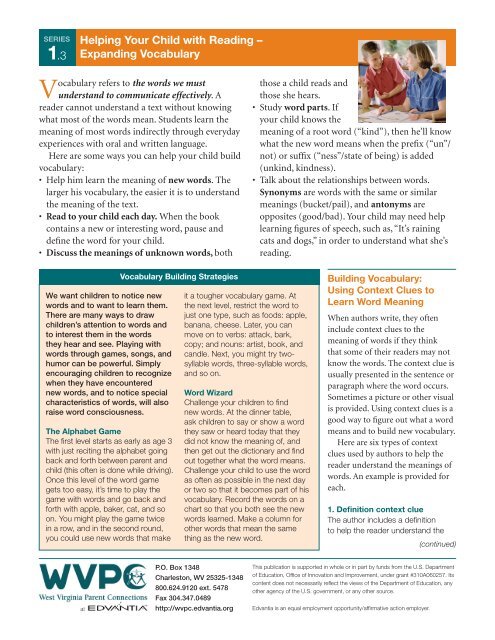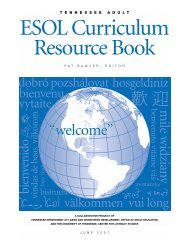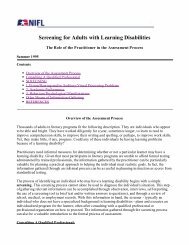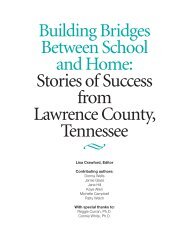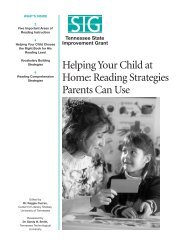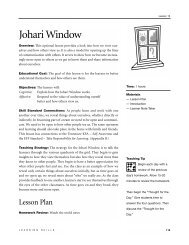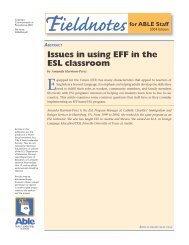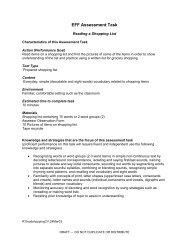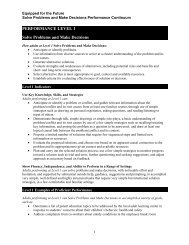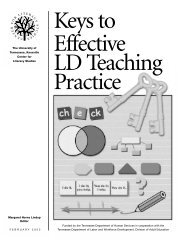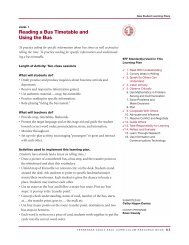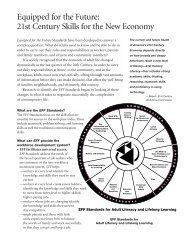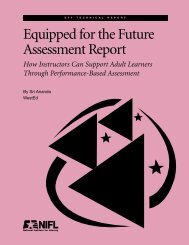1.3 Helping Your Child with Reading – Expanding Vocabulary
1.3 Helping Your Child with Reading – Expanding Vocabulary
1.3 Helping Your Child with Reading – Expanding Vocabulary
Create successful ePaper yourself
Turn your PDF publications into a flip-book with our unique Google optimized e-Paper software.
SERIES<strong>1.3</strong><strong>Helping</strong> <strong>Your</strong> <strong>Child</strong> <strong>with</strong> <strong>Reading</strong> <strong>–</strong><strong>Expanding</strong> <strong>Vocabulary</strong><strong>Vocabulary</strong> refers to the words we mustunderstand to communicate effectively. Areader cannot understand a text <strong>with</strong>out knowingwhat most of the words mean. Students learn themeaning of most words indirectly through everydayexperiences <strong>with</strong> oral and written language.Here are some ways you can help your child buildvocabulary:• Help him learn the meaning of new words. Thelarger his vocabulary, the easier it is to understandthe meaning of the text.• Read to your child each day. When the bookcontains a new or interesting word, pause anddefine the word for your child.• Discuss the meanings of unknown words, boththose a child reads andthose she hears.• Study word parts. Ifyour child knows themeaning of a root word (“kind”), then he’ll knowwhat the new word means when the prefix (“un”/not) or suffix (“ness”/state of being) is added(unkind, kindness).• Talk about the relationships between words.Synonyms are words <strong>with</strong> the same or similarmeanings (bucket/pail), and antonyms areopposites (good/bad). <strong>Your</strong> child may need helplearning figures of speech, such as, “It’s rainingcats and dogs,” in order to understand what she’sreading.We want children to notice newwords and to want to learn them.There are many ways to drawchildren’s attention to words andto interest them in the wordsthey hear and see. Playing <strong>with</strong>words through games, songs, andhumor can be powerful. Simplyencouraging children to recognizewhen they have encounterednew words, and to notice specialcharacteristics of words, will alsoraise word consciousness.The Alphabet GameThe first level starts as early as age 3<strong>with</strong> just reciting the alphabet goingback and forth between parent andchild (this often is done while driving).Once this level of the word gamegets too easy, it’s time to play thegame <strong>with</strong> words and go back andforth <strong>with</strong> apple, baker, cat, and soon. You might play the game twicein a row, and in the second round,you could use new words that make<strong>Vocabulary</strong> Building Strategiesit a tougher vocabulary game. Atthe next level, restrict the word tojust one type, such as foods: apple,banana, cheese. Later, you canmove on to verbs: attack, bark,copy; and nouns: artist, book, andcandle. Next, you might try twosyllablewords, three-syllable words,and so on.Word WizardChallenge your children to findnew words. At the dinner table,ask children to say or show a wordthey saw or heard today that theydid not know the meaning of, andthen get out the dictionary and findout together what the word means.Challenge your child to use the wordas often as possible in the next dayor two so that it becomes part of hisvocabulary. Record the words on achart so that you both see the newwords learned. Make a column forother words that mean the samething as the new word.Building <strong>Vocabulary</strong>:Using Context Clues toLearn Word MeaningWhen authors write, they ofteninclude context clues to themeaning of words if they thinkthat some of their readers may notknow the words. The context clue isusually presented in the sentence orparagraph where the word occurs.Sometimes a picture or other visualis provided. Using context clues is agood way to figure out what a wordmeans and to build new vocabulary.Here are six types of contextclues used by authors to help thereader understand the meanings ofwords. An example is provided foreach.1. Definition context clueThe author includes a definitionto help the reader understand the(continued)P.O. Box 1348Charleston, WV 25325-1348800.624.9120 ext. 5478Fax 304.347.0489http://wvpc.edvantia.orgThis publication is supported in whole or in part by funds from the U.S. Departmentof Education, Office of Innovation and Improvement, under grant #310A060257. Itscontent does not necessarily reflect the views of the Department of Education, anyother agency of the U.S. government, or any other source.Edvantia is an equal employment opportunity/affirmative action employer.
meaning of a word. In the followingexample, “tainted” is defined ashaving a disease.The people of the town were warnednot to eat the tainted fish. The localnewspaper published a bulletinin which readers were clearly toldthat eating fish that had a diseasecould be very dangerous. This wasespecially true for fish caught inLake Jean.2. Synonym context clueThe author includes a synonymto help the reader understand themeaning of a word. A synonym isa word that means the same as ornearly the same as another word. Inthe following example, the synonym“pity” helps the reader understand themeaning of “compassion.”After seeing the picture of thestarving children, we all feltcompassion or pity for theirsuffering.3. Antonym context clueThe author includes an antonymto help the reader understand themeaning of a word. An antonymis a word that means the oppositeof another word. In the followingexample, the antonym “eager” helpsthe reader understand the meaning of“reluctant.”Joe was reluctant to take on theposition of captain of the basketballteam. He was afraid that the time itwould take would hurt his grades.On the other hand, Billy was eagerfor the chance to be captain. Hethought that being captain of theteam would make him very popularin school.4. Description context clueThe author includes one or moredescriptions to help the readerunderstand the meaning of aword. In the following example,descriptions of President Kennedyas having charm, enthusiasm, anda magnetic personality help thereader understand the meaning of“charismatic.”John Fitzgerald Kennedy, our 35thpresident, improved human rightsand equal rights for all people. Hewas a very charismatic president.People were attracted to his charmand enthusiasm. His personality wasdescribed as magnetic.5. Summary context clueThe author makes a number ofstatements that help the readerunderstand the meaning of aword. In the following example,statements about being rude,showing no respect, having poormanners, and being impolite help thereader understand the meaning of“impertinent.”Andrea was a very impertinentyoung lady. She was so rude thatPrefixes and Suffixesshe talked while her teacher wasexplaining a lesson. She showedno respect for other students. Hermanners were very poor. Even herparents thought that Andrea wasimpolite.6. Visual context clueThe author includes a picture,drawing, chart, graph, or other type ofvisual to help the reader understandthe meaning of a word. In thefollowing example, putting the pictureand its caption close to the sentencehelps the reader understand that“exultant” means great joy.Peggy had an exultantlook on her face.Adapted from: http://www.how-to-study.com/buildingvocabulary.htm<strong>Child</strong>ren also need to know how words are formed—the root words,suffixes (a word part added to the end of a word), and prefixes (a wordpart added before a word), and how the word is affected by added parts.Can your children add suffixes and prefixes to these words (sometimeschanging a letter or two) to make new words?Prefixesunpreantisemidisenunirunoverremisdisinterimirunpresemiundisen-New WordunkindRoot WordkindfixsocialweekenchanttangleglueregularformuseviewspokesatisfymingleprintresponsibleluckyhelpfinalfriendcovercourageNew WordkinderSuffixes-er-ative-able-ly-ing-ment-less-ly-ation-ful-al-en-ed-d-er-ity- ness- ful-ity-ly-ed-mentThis resource is provided by West Virginia Parent Connections at Edvantia; get more information online at wvpc.edvantia.org.


